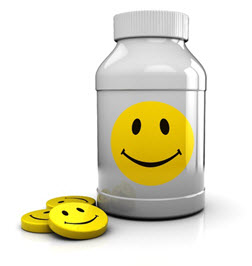My friend, Sandra, invited me over to her place for dinner one night a couple of weeks ago. She is a terrific conversationalist, so when we get together we have a tendency to flesh out subjects to their very fullest, way beyond what they probably deserve, but nevertheless, that us.
The conversation on this particular evening found its way to antidepressants. It went like this: “Joe, I get the impression from reading your book that you’re not a fan of antidepressant use in sort of benign circumstances, like helping people to cope better. I think you’re wrong about that. I have a friend, Jackie whom I have known for 40 years and she has been taking Zoloft for quite some time now, and I swear to you that she’s different for the better. I have never thought of her as depressed, but she describes her life as smoother, and I see that and agree with her that the Zoloft is helping. So what I’m saying is that you seem to place antidepressants in a sort of defined “box” without focusing on their peripheral benefits.”
 The next day I went back and reviewed what I had written in my third edition Psychopharmacology book as well as hundreds of blog posts on the subject of antidepressants. And for sure, a preponderance of what I have written cast a pall over these drugs when prescribed for circumstances outside of more severe, melancholic, vegetative, anhedonic depression. I had stressed in my writings that antidepressants often fueled false hope and are often prescribed cavalierly by primary care prescribers with little knowledge of how to properly assess for depression. I picked on the pharmaceutical companies for duping people into believing that antidepressants were the answer to their woes — through well-crafted ads with a most sympathetic voice over accompaniment. And I felt satisfied that I wasn’t alone regarding the notion that Prozac, Zoloft and Lexapro, among others, are little more than placebos with side effects — as this was a belief that had gone mainstream. I looked to countless bodies of work that supported antidepressant efficacy as a phenomenon that resided mostly in someone’s head, all of it backed by the most prestigious medical journals in the world. In psychiatry however, practically all outcome studies are flawed in some way, whether it be poor methodology or inadequate sample size. At the very least, the implications of any study are open and subject to competing interpretations.
The next day I went back and reviewed what I had written in my third edition Psychopharmacology book as well as hundreds of blog posts on the subject of antidepressants. And for sure, a preponderance of what I have written cast a pall over these drugs when prescribed for circumstances outside of more severe, melancholic, vegetative, anhedonic depression. I had stressed in my writings that antidepressants often fueled false hope and are often prescribed cavalierly by primary care prescribers with little knowledge of how to properly assess for depression. I picked on the pharmaceutical companies for duping people into believing that antidepressants were the answer to their woes — through well-crafted ads with a most sympathetic voice over accompaniment. And I felt satisfied that I wasn’t alone regarding the notion that Prozac, Zoloft and Lexapro, among others, are little more than placebos with side effects — as this was a belief that had gone mainstream. I looked to countless bodies of work that supported antidepressant efficacy as a phenomenon that resided mostly in someone’s head, all of it backed by the most prestigious medical journals in the world. In psychiatry however, practically all outcome studies are flawed in some way, whether it be poor methodology or inadequate sample size. At the very least, the implications of any study are open and subject to competing interpretations.
Hindsight is a priceless ally. The more thought I gave to what Sandra had said about the improvement she’s seen in her friend Jackie, the more I realized that I have numerous people in my circle of friends and colleagues who have reported similar benefits from antidepressants —benefits that are not placebo-driven, but instead the result of the inherent clinical properties of these drugs to strengthen and restore some sort of resilience to the brain. These neuroprotective antidepressant benefits thus help people better accommodate and cope with internal and external invaders to which they would otherwise fall prey. Thus they feel brighter, are more enthusiastic, better energized, have a more positive outlook on life, and overall, cope better with adversity. Life is just smoother. And another thing: Some of those I treat with psychotherapy just don’t possess the strength, fortitude and will to persevere through the interventions and exercises I prescribe for them, in spite of their long-proven efficacy. These patients are not able to push themselves beyond a certain point, thus progress stalls. Antidepressants may be a catalyst to help them persist in their quest to improve their plight.
What Sandra was alluding to in the conversation I spoke of above is really the concept of “partial remission,” in that these drugs don’t provide complete symptom relief in the majority of users, but can help make everyday life seem less ominous. However, I steadfastly believe that antidepressants shouldn’t be prescribed to people with vague complaints of depression that amount to no more than life’s everyday ups and downs.
I have one more confession to make that I have not mentioned in any of my writings. Today, I rarely am referred a patient with the type of debilitating “end of the line” depression I would see years ago in my practice. I have asked colleagues what they see and their responses are uniform: very little paralyzing melancholy is showing up in their offices as well.
 Antidepressants have been available since the 1950s, but psychiatry was reluctant to prescribe them because it believed that these drugs robbed patients of their autonomy. Psychotherapy was offered, but otherwise depression was allowed to run its course, thus many people moved from depression to severe depression to immobilizing despair. This all changed in the 1980s with the coming of the Prozac family of drugs — easier to use antidepressants that were readily able to interrupt the slide into all but total incapacitation. And my impression of why end stage depression is so less common is that primary care doctors started prescribing them (although haphazardly in some cases) and the broad effects of these agents slowed the progression of symptoms, improving overall quality of life, at least somewhat. Thus depression as with many forms of cancer, can move from life-ending to chronic, and not be allowed to linger.
Antidepressants have been available since the 1950s, but psychiatry was reluctant to prescribe them because it believed that these drugs robbed patients of their autonomy. Psychotherapy was offered, but otherwise depression was allowed to run its course, thus many people moved from depression to severe depression to immobilizing despair. This all changed in the 1980s with the coming of the Prozac family of drugs — easier to use antidepressants that were readily able to interrupt the slide into all but total incapacitation. And my impression of why end stage depression is so less common is that primary care doctors started prescribing them (although haphazardly in some cases) and the broad effects of these agents slowed the progression of symptoms, improving overall quality of life, at least somewhat. Thus depression as with many forms of cancer, can move from life-ending to chronic, and not be allowed to linger.
I concede that some of the positive effects of antidepressants experienced by some people, such as living life more smoothly, are anathema to how I view depression and its treatment. (I have always supported antidepressant use in cases of severe melancholia). My conversation with my friend Sandra though, opened my eyes to the idea that my views are too restrictive in some instances, so I will modify my treatment planning as a result.
New learning is about listening, and growing personally or professionally is about expanding thinking and behavior outside of our comfort zone.
Attribution Statement:
Joe Wegmann is a licensed pharmacist & clinical social worker has presented psychopharmacology seminars to over 10,000 healthcare professionals in 46 states, and maintains an active psychotherapy practice specializing in the treatment of depression and anxiety. He is the author of Psychopharmacology: Straight Talk on Mental Health Medications, published by PESI, Inc.
To learn more about Joe’s programs, visit the Programs section of this website or contribute a question for Joe to answer in a future article: joe@thepharmatherapist.com.